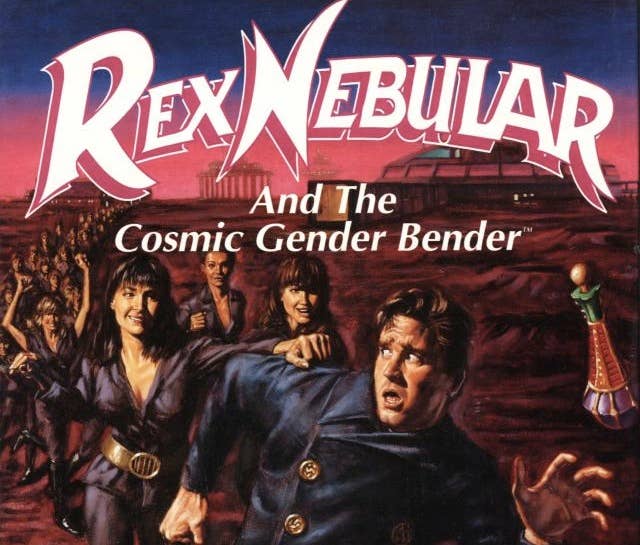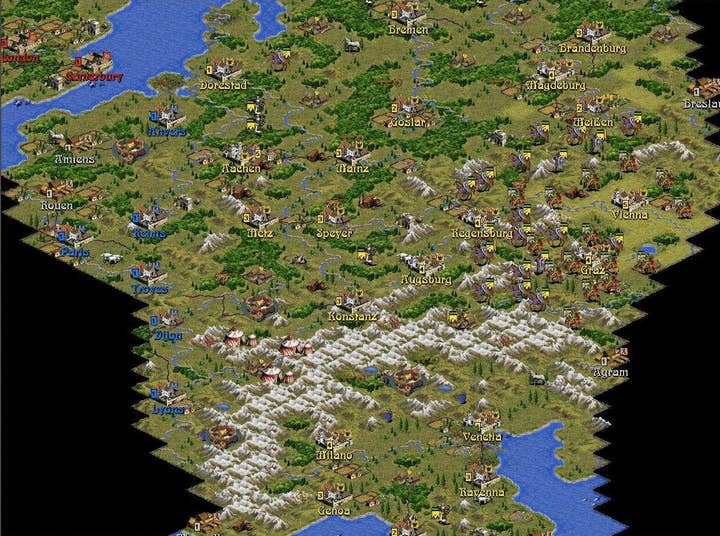Game Industry Legends: Brian Reynolds
The designer of Rise of Nations and FrontierVille talks about the industry, design, and a game title you can't forget
Brian Reynolds has been creating games professionally since 1981 when he was only 13, but it was MicroProse where he first worked as a professional programmer, and began working with Sid Meier, which led to Sid Meier's Colonization in 1994 (similar to Civilization, but never became popular).
Reynolds designed a number of best-selling games at the company he co-founded with Meier, Firaxis, including Sid Meier's Alpha Centuari. Reynolds left Firaxis in 2000 to become CEO of Big Huge Games, where he made Rise of Nations among other games.
Reynolds became Chief Game Designer at Zynga in 2009, forming Zynga East, where he designed FrontierVille. GamesIndustry International spoke with Reynolds about his decades in the game industry, the future of games, and his thoughts on design.
Ironically, my first sort of "published" game was in 1981, when I was 13 years old. I sold a game that was the cover feature of the August 1981 Softside magazine, it was a little roleplaying game. I think I made $200 from that, and plowed it into 32K more memory for my personal computer. The first thing I did as an official industry person, I was the lead programmer for a game called (laughs), and this is gonna be a doozy, Rex Nebular and the Cosmic Gender Bender.
At least it had a memorable name, I'm not sure it had a good name.
"I can remember times in my triple-A career, especially towards the end of it, where you could go a whole month without doing any game design, because you were just waiting on technology, and art, and 3D stuff"
Brian Reynolds
As all these teams do, it started smaller and got bigger, but I think it might have topped out at around 15 or 16 of us.
I imagine that, you know I was just the lead programmer not the businessy guy, but if I was just guessing I would say we might have spent between $100,000 and $200,000 dollars making that game.
It was the good old days, yeah, definitely. The thing is, not only did we not have many people but they weren't paying us anything either. Those are the parts we forget about the good old days.
Nowadays, the budgets and team sizes are orders of magnitude bigger.
Certainly if you want to make a triple-A game these days it's probably $30 million to $100 million just to get in the door, and that's not even MMO. Even a few years ago just looking at the bare-bones entry to doing an MMO was $50 million. It is pretty crazy. I can remember times in my triple-A career, especially towards the end of it, where you could go a whole month without doing any game design, because you were just waiting on technology, and art, and 3D stuff.
It's great for me to get back into a world where it really is more about the gameplay and not quite as much about the technology and artwork and 3D whatever. At the same time, we are on an accelerated ramp in this space, if you look at what social games looked like way back in '08 and '09 (laughs) and then you look at what's coming out now.

The transition from the packaged good model to a games-as-a-service model is definitely a big transition. Before you spent several years and you packed it all up and you're not going to get a chance to do anything new to it once you're done so you've got to get it perfect. You don't get to iterate on feedback from your players very much; if you're lucky you might get to do one minor patch... and then you're just on to the next project.
If you're an independent studio, which is where I spent most of my time, then you're almost immediately worried about being out of work or out of business and you've got to have the next contract lined up. If you have a staff of 60 people, now you're trying to start some new thing, and do you need all 60 people right away? That's why the triple-A industry frankly invented expansion packs and downloadable content, because that's what gives half the team something to do while the rest of the team is making the next game.
Now in social games we're making these games and we put 'em up and that's only the tip of the iceberg. On the one hand you have to keep updating it, but on the other hand you get to keep updating it, so in a sense you're continuing to evolve your game as you go. You get a lot of very fast-cycle feedback from your players, and you see what they're actually doing in the game, and you're able to incorporate that into making your game better. For a game designer that's really tightened up the feedback loop and made it so that we can figure out the fun kind of content faster.
It can, and learning how to incorporate that information skillfully... for example, you've got all this data on which things your players click on, you can see that the red button got clicked on more times than the blue button. The unskillful way to deal with all that data is to say 'Well, let's make all your buttons red!' You don't want to have a knee-jerk reaction to data. You really need to digest it and figure out how to use the information to make a sophisticated smart decision.
I don't want to give anybody the idea that game design has suddenly gone from being an art to being a science. It's just got a new, much more scientific tool that does in fact satisfy some of the things we always wished for in the old days as game designers. It lets us make a lot of different parts of the game better. The obvious stuff is making the user interface better because you get really quick feedback. It also even points us toward more interesting content - we can see which stories players like better.
"I think we're going to see games as a service really take over as the dominant part of the game industry if it hasn't already"
Brian Reynolds
It probably makes it a more complicated task in some ways. FarmVille's been running continuously for... in June it'll be three years. That's a long time after launch to still be having millions of people a day come and play your game and keep 'em happy.
In some ways that's a different game design skill. There might actually be another kind of schism in the profession, as it were, like two species separating. I think we're going to see games as a service really take over as the dominant part of the game industry if it hasn't already, for the simple reason that if you're doing packaged goods you have this problem of piracy, and if you're doing games as a service then you really don't have that issue. Even when you look at AAA games today they're becoming more and more sort of online-ified.
Well, they always surprise me. It's an industry full of what they call black swan events. You just never can predict what the next crazy thing that's gonna take off is. The first big technological change I went through was when we went from floppy discs to CD-ROM. We used to pay a dollar a disc for 3.5" floppies to put in the box, and you'd be putting ten of them in, so that was like $10 of packaged goods costs for a game you might be selling for $40 or $50. Then we went to CD-ROMs, and the next year we were just paying $1 of packaged goods, because you put one CD-ROM in with the same game on it. There was no noticeable price change to the customer, but the margin... we were actually no longer going out of business like we were the year before. Suddenly the business was profitable again.
The next big one was when games went over to Windows, and I ended up in a pretty good place on that transition, because I was working on a game called Civ 2. People remember Civ 2 because they loved playing the game, but one of the hidden stories is it was actually a very accessible piece of software to a much larger audience because it was Windows and it went along with Windows 95, and every new system that was coming out was being sold with Windows 95, and our game was easy to run.
Then there was another transition, and this was a harder one for me, when the packaged good PC model started to die and was overcome by the console games, but the type of games I liked to make in those days were strategy games. Back in the early 2000s we were still making PC games, but then it was just all console all the time. If your genre didn't run well on consoles, you were in trouble - so I was in trouble! But that positioned me perfectly to be looking for something new to do when the next amazing thing came along which is Facebook games, and so there I was. Actually a lot of the skills I had were perfect for doing social games. That has certainly been the next big transition, and I was on the lucky end of that one.
The next big thing... I think mobile is starting to make its move to take over the world. The fact is that smartphone penetration is still not up in the high 90% range, but it's gonna be getting there over the next few years. That's probably going to make games that involve a mobile component the next big area in terms of a huge wave of innovation and capability and dominance within the industry. I think that's the next big growth area.

There had been a giant meltdown of the business model in the '80s when they were burying Atari cartridges in landfills. Then in the late '80s and the early '90s the industry got back on track again. We had 10 years there where the business model was substantially the same. The paradigm shifts lately have certainly been bigger ones, although they haven't crushed the life out of the old business models. There's still console games that come out and make a billion dollars on the first day; it's certainly still a profitable business.
I would certainly like to see them have one, both as a player and as a social game designer. It might remain to be seen what they can do that would be good. I remember in my time as a console game designer, I worked pretty closely with the various guys who design and make consoles, and they were always very against having a keyboard on a console. A keyboard, that makes it geeky and like a computer, and then it's not this cool entertainment system. Social media is about talking to each other and uploading pictures... well, it's about uploading pictures but it's also about commenting on them. If I can't leave a comment we'd just be down to the Like button, but that would be a little bit thin as social coverage for me. I'm sure they're not going to suddenly decide that they should suddenly put keyboards on consoles. Maybe they'll put touchscreens or something; I can totally imagine that, because smartphones and iPads make fantastic social devices, but how do you work that into a console?
Exactly. I'm sure they're thinking about this. They're going to have to find some way for us to actually communicate without making it look geeky.
"I think mobile is starting to make its move to take over the world"
Brian Reynolds
It's going to be disruptive innovation. Facebook was an extremely disruptive innovation both in the web space and following on in the games space. The whole point was that nobody saw it coming. I don't know what's coming in ten years. I'll be along for the ride with everybody else.
Yes, that was another one. I admit to hearing about the iPad and thinking, 'Well, that's just the dumbest idea I ever heard.' That's why I'm not a tech inventor, I'm a game designer; it's a very different set of skills.
It is one of the more upheavious ones, yes, in the last few years. When you see the NPD reports that console games sales have dropped 20% since the previous year, that's a big drop for a business to take during a year. In 2009 when I came to Zynga, it wasn't like there I was really excited about staying in the triple-A space. It felt like, do I really want to go down with the ship, or do I want to go get on the really cool new ship that's doing the new thing? That's the kind of thing that is going on. You're either learning completely new skills or trying to shore up the old business model against new disruptive forms of competition. The only other upheaval that maybe compares is the bigger one in the '80s when the whole first-generation console market just crashed. That was a bigger upheaval.
The game industry as a whole now is still substantially growing, so this is the good kind of upheaval.
I feel like in terms of game design itself, the core activity of how you make a game, how you make things fun, have remained largely the same. The kinds of candidates I look for in game design jobs are the same as I used to look for in previous decades. It's interesting in 21 years of radical technological change, the same techniques that Sid Meier taught me in the early '90s are still highly relevant today to how you take a game and make it more fun.
I do. As recently as FrontierVille, I actually got my hands dirty on writing code, believe it or not. I'm not writing any code so far on my current game, but I'm definitely in the design loop. My title is Chief Game Designer; it doesn't mean I'm telling other designers what to do, it's more of a first among equals kind of thing. Usually the way that I can effect the most change within Zynga on improving game design practices is to make a really cool game. Then everybody says, "Wow, how do I get me some of that?" And then I tell them, and then they do. I've found that to be the most effective way to drive innovation.
I agree, I would be sad if that was what I was doing. I've worked very hard for 20 years to avoid any kind of primarily management position. Even when I was CEO of Big Huge I had a business partner who did most of the things you would formally call business. I lead teams, it's not like I'm completely free of having to have any leadership ability, but the point is my emphasis has always been on actually making the games.
I agree!









